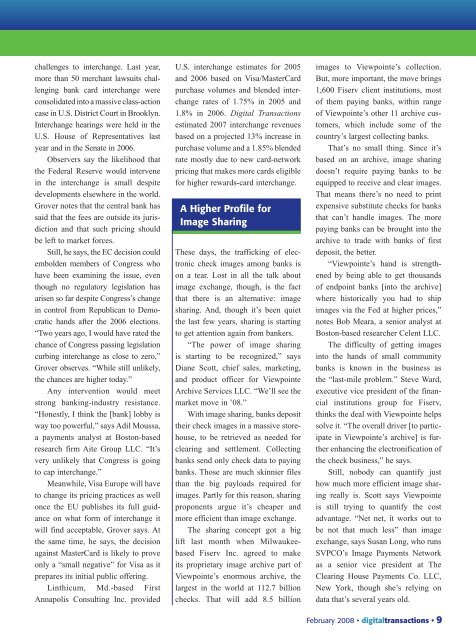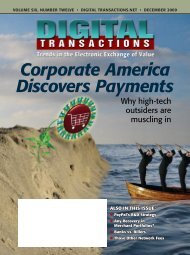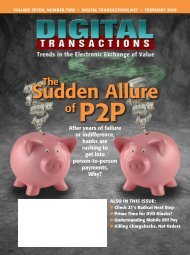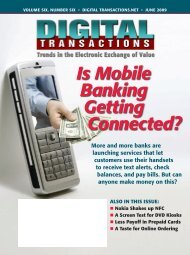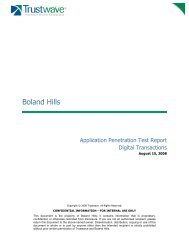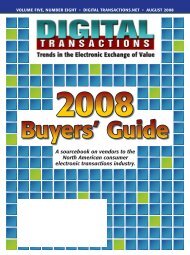The Broken Link - Digital Transactions
The Broken Link - Digital Transactions
The Broken Link - Digital Transactions
Create successful ePaper yourself
Turn your PDF publications into a flip-book with our unique Google optimized e-Paper software.
challenges to interchange. Last year,<br />
more than 50 merchant lawsuits challenging<br />
bank card interchange were<br />
consolidated into a massive class-action<br />
case in U.S. District Court in Brooklyn.<br />
Interchange hearings were held in the<br />
U.S. House of Representatives last<br />
year and in the Senate in 2006.<br />
Observers say the likelihood that<br />
the Federal Reserve would intervene<br />
in the interchange is small despite<br />
developments elsewhere in the world.<br />
Grover notes that the central bank has<br />
said that the fees are outside its jurisdiction<br />
and that such pricing should<br />
be left to market forces.<br />
Still, he says, the EC decision could<br />
embolden members of Congress who<br />
have been examining the issue, even<br />
though no regulatory legislation has<br />
arisen so far despite Congress’s change<br />
in control from Republican to Democratic<br />
hands after the 2006 elections.<br />
“Two years ago, I would have rated the<br />
chance of Congress passing legislation<br />
curbing interchange as close to zero,”<br />
Grover observes. “While still unlikely,<br />
the chances are higher today.”<br />
Any intervention would meet<br />
strong banking-industry resistance.<br />
“Honestly, I think the [bank] lobby is<br />
way too powerful,” says Adil Moussa,<br />
a payments analyst at Boston-based<br />
research firm Aite Group LLC. “It’s<br />
very unlikely that Congress is going<br />
to cap interchange.”<br />
Meanwhile, Visa Europe will have<br />
to change its pricing practices as well<br />
once the EU publishes its full guidance<br />
on what form of interchange it<br />
will find acceptable, Grover says. At<br />
the same time, he says, the decision<br />
against MasterCard is likely to prove<br />
only a “small negative” for Visa as it<br />
prepares its initial public offering.<br />
Linthicum, Md.-based First<br />
Annapolis Consulting Inc. provided<br />
U.S. interchange estimates for 2005<br />
and 2006 based on Visa/MasterCard<br />
purchase volumes and blended interchange<br />
rates of 1.75% in 2005 and<br />
1.8% in 2006. <strong>Digital</strong> <strong>Transactions</strong><br />
estimated 2007 interchange revenues<br />
based on a projected 13% increase in<br />
purchase volume and a 1.85% blended<br />
rate mostly due to new card-network<br />
pricing that makes more cards eligible<br />
for higher rewards-card interchange.<br />
A Higher Profile for<br />
Image Sharing<br />
<strong>The</strong>se days, the trafficking of electronic<br />
check images among banks is<br />
on a tear. Lost in all the talk about<br />
image exchange, though, is the fact<br />
that there is an alternative: image<br />
sharing. And, though it’s been quiet<br />
the last few years, sharing is starting<br />
to get attention again from bankers.<br />
“<strong>The</strong> power of image sharing<br />
is starting to be recognized,” says<br />
Diane Scott, chief sales, marketing,<br />
and product officer for Viewpointe<br />
Archive Services LLC. “We’ll see the<br />
market move in ’08.”<br />
With image sharing, banks deposit<br />
their check images in a massive storehouse,<br />
to be retrieved as needed for<br />
clearing and settlement. Collecting<br />
banks send only check data to paying<br />
banks. Those are much skinnier files<br />
than the big payloads required for<br />
images. Partly for this reason, sharing<br />
proponents argue it’s cheaper and<br />
more efficient than image exchange.<br />
<strong>The</strong> sharing concept got a big<br />
lift last month when Milwaukeebased<br />
Fiserv Inc. agreed to make<br />
its proprietary image archive part of<br />
Viewpointe’s enormous archive, the<br />
largest in the world at 112.7 billion<br />
checks. That will add 8.5 billion<br />
images to Viewpointe’s collection.<br />
But, more important, the move brings<br />
1,600 Fiserv client institutions, most<br />
of them paying banks, within range<br />
of Viewpointe’s other 11 archive customers,<br />
which include some of the<br />
country’s largest collecting banks.<br />
That’s no small thing. Since it’s<br />
based on an archive, image sharing<br />
doesn’t require paying banks to be<br />
equipped to receive and clear images.<br />
That means there’s no need to print<br />
expensive substitute checks for banks<br />
that can’t handle images. <strong>The</strong> more<br />
paying banks can be brought into the<br />
archive to trade with banks of first<br />
deposit, the better.<br />
“Viewpointe’s hand is strengthened<br />
by being able to get thousands<br />
of endpoint banks [into the archive]<br />
where historically you had to ship<br />
images via the Fed at higher prices,”<br />
notes Bob Meara, a senior analyst at<br />
Boston-based researcher Celent LLC.<br />
<strong>The</strong> difficulty of getting images<br />
into the hands of small community<br />
banks is known in the business as<br />
the “last-mile problem.” Steve Ward,<br />
executive vice president of the financial<br />
institutions group for Fiserv,<br />
thinks the deal with Viewpointe helps<br />
solve it. “<strong>The</strong> overall driver [to participate<br />
in Viewpointe’s archive] is further<br />
enhancing the electronification of<br />
the check business,” he says.<br />
Still, nobody can quantify just<br />
how much more efficient image sharing<br />
really is. Scott says Viewpointe<br />
is still trying to quantify the cost<br />
advantage. “Net net, it works out to<br />
be not that much less” than image<br />
exchange, says Susan Long, who runs<br />
SVPCO’s Image Payments Network<br />
as a senior vice president at <strong>The</strong><br />
Clearing House Payments Co. LLC,<br />
New York, though she’s relying on<br />
data that’s several years old.<br />
February 2008 • digitaltransactions • 9


